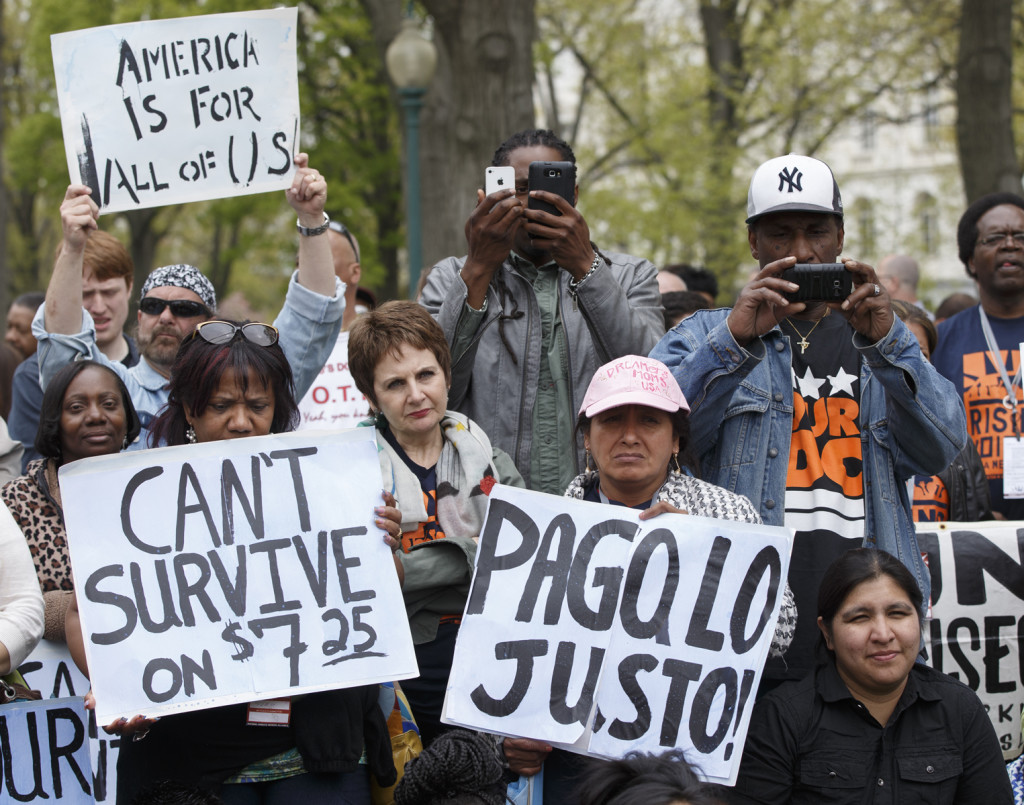The minimum wage war continues in Seattle. This past Thursday was Mayor Ed Murray’s deadline for making his proposal on raising minimum wage in Seattle; however, The New York Times quoted his statement saying, “We’re stuck at the moment…”
Murray said this spring that if his committee cannot come to an agreement on a proposal, he will present an idea to the City Council about minimum wage and its effect on service worker’s tips himself “I’d rather be late and get it right than rush it and get it wrong,” said Murray to The New York Times.
While the right proposal is always preferable to the wrong one, a proposal on time is always much appreciated by the public. Bon Appétit employee Melissa Cortez said, “People like the Mayor shouldn’t back down from things like this.”

Low-wage workers rally on Capitol Hill in Washington, Monday, April 28, 2014, to urge Congress to raise the minimum wage as lawmakers return to Washington following a two-week hiatus. Democrats been pushing to raise the minimum wage but even if any legislation is passed in the Senate, it is certain to be ignored in the Republican-controlled House.
Cortez claims low-income individuals rely on him to make decisions. The decisions he makes about the minimum wage issue greatly affect the lives of these individuals directly.
“They struggle more,” she continued, “because they have to sit and wait for his answers.” The public depends on the government for answers so they know how to properly adjust their lives to the new rules and regulations of their own city or town.
Brushing her hair out of her face, she folded her hands and finished with, “It shows indecisiveness really.”
On the other hand, Ritu Shah-Burnham, the owner of small Capitol Hill eatery Zpizza seems to have a more understanding approach.
“It’s a tough decision to make. A really tough, tough decision,” he said. It affects the economy of Seattle and, in turn, all of its citizens. From small businesses to big corporations, everyone will feel the outcomes of his decision.
The members of the Mayor’s committee consist of small business owners, restaurant owners, corporate individuals, and middle class businessmen. These individuals emerge from different social statuses and diverse backgrounds, which cover the wide spectrum of residents found here in Seattle.
While the Mayor’s committee’s strength lies in its appropriate representation of Seattleites, its diversity is also its weakness.
“What we’re asking of the Mayor and his committee is a big task. We are asking all of these individuals to come to an agreement that affects different people in different ways,” Burnham said. “Maybe they should consider maintaining total compensation. Some people need to be making minimum wages plus their tips.”
Many people depend greatly on their tips as their main source of income. Bridget Maloney was interviewed by a Seattle Times journalist who inquired about her minimum wage and tips. In the article, Maloney states “On weekends, I can make up to $45 an hour…”
She, among others like Cortez claim those making tips through service jobs should have lower minimum wages so their tips remain.
“Having a $5 minimum wage for non-tipped service workers and a lower minimum wage for tipped workers is an excellent idea,” Cortez said, “It evens out the playing field so everyone makes a decent amount of money.”
For Burnham, total compensation is the ideal way for the situation to be dealt with. “My workers make bank off of their tips,” she said. “That’s why we have such good service here.”
When minimum wage raises to $15 per hour, business owners will then have to raise the prices of their products to compensate for the higher wages. This will result in a domino effect causing customer tips to lessen.
Workers who receive lower tip amounts, tend to care less about the service they are providing. Those who take the time to get to know their customers and please them in every way possible make a decent hourly average in tips, according to Cortez.
“On a good night my workers walk out with $40 to $60 in tips alone. And that doesn’t even take into consideration the amount they made off of their hourly salary for the night,” Burnham said.
Working in the service industry for her entire adult life, Burnham understands the incentive needed to give proper service to customers. The tips drive the service industry. Service places like restaurants deal with happy customers when they have polite servers. Businesses have polite servers when they have healthy tipping customers.
“It’s all connected,” Cortez said, “I wouldn’t be that nice if I didn’t think I was going to get tipped.”
Some businessmen may profit from this high minimum wage, but they don’t benefit from having tips. An even playing field, fair to all, is what this committee is shooting for. But for now, Seattle may have to wait until next spring to see what agreement will be reached.












